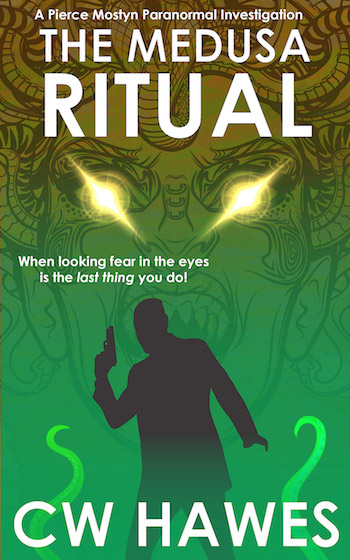Crime can pay. Crime writing, that is. Then, again, real crime can pay too. But we’ll leave real crime for others to do. Today I want to talk about crime fiction; specifically about mysteries, suspense, and thrillers.
Thrillers
Thrillers are all the rage these days, but what exactly is a thriller?
A thriller is an action story. Usually fast-paced. The protagonist is in danger from the beginning. There is a bad guy and the protagonist must stop him (or her) from accomplishing his nefarious deed. We usually know the good and bad guys right from the beginning.
The scope of the thriller is often large. The bad guy isn’t playing for pennies. He’s going to blow up a city, poison a country, start a nuclear war. The thriller is about big action and big bad guys. The protagonist, to some degree, must also be larger than life.
The works of Tom Clancy and Clive Cussler are examples of good thrillers.
In the hands of a good writer, the thriller can be a thrilling read. Often, though, the writing is sub-par and the story not plausible, unless I, the reader, exercise a mega-dose of the suspension of disbelief. This is how the Jack Reacher stories strike me.
Many books are labeled as thrillers, which technically aren’t. Why? Money. As one wit noted, the difference between a mystery and a thriller is about a hundred thousand dollars.
Suspense
The suspense novel is often a slow burn story. The focus isn’t on action, although there may be quite a bit of action. The focus is on creating a feeling of suspense in the reader.
In the suspense story, the reader is omniscient. We see everything. We see the bad guy planning whatever it is he is going to do. We see the protagonist completely unaware, at least at the beginning, of the bad guy and his actions. We, the reader, see much more of the danger than the protagonist does and therein lies the creation of suspense.
The scope of the suspense story is generally limited and focused on the main character. Things are happening, usually to the main character, and he doesn’t know why. We, the reader, usually do, however, which adds to the suspense.
Cornell Woolrich was the suspense writer par excellence. Lester Dent also wrote some fine suspense novels.
The Mystery
The mystery is about solving crime, usually a murder. The crime usually happens at the beginning of the story and the sleuth’s job is to solve it. The protagonist (the sleuth) can be a professional or an amateur. And we usually do not learn who the bad guy is until the end of the story.
There are many mystery sub-categories. Right now, the most popular is what I call the chick lit cozy. It is the cozy mystery with the addition of elements from chick lit: a young (or youngish) woman, who is the main character/sleuth; she is divorced or a widow; has moved to a new location, and embarked on a new career; and there’s romance. Along with the regular cozy mystery, these are very clean and non-violent reads.
An indie example is Agatha Frost’s Peridale Cafe Murder Mystery series.
In a mystery, the reader only knows what he or she is told. We see what the sleuth sees. The story is as much a puzzle for the reader as it is for the protagonist.
The mystery can be filled with suspense and it can be thrilling. The danger to the protagonist builds, along with the story. The more the sleuth learns about the criminal, the greater the danger he or she is in.
Personal Assessment
For me, I find the mystery to be the most satisfying reading experience. It combines the puzzle with suspense and thrilling action.
While the mystery is technically a plot-driven story, rather than character-driven, I find that the most interesting mysteries are those which have interesting characters.
Mystery plots are basically all the same. There is a murderer who has killed someone and is trying to cover up the crime while the sleuth is trying to uncover it.
What makes the mystery story interesting is the cast of characters and the twists and turns of the storyline. And quite often the cast of characters can save a mediocre storyline.
After all, we remember Nero Wolfe, Sam Spade, Hercule Poirot, Mr and Mrs North, and Sherlock Holmes. But how many of the actual mystery stories featuring these characters do we remember? I bet not many.
In my opinion, interesting characters make mysteries more interesting reads than thrillers or suspense novels. Which usually have fairly stock characters.
Pacing is another reason I prefer the mystery as a reader. The pacing accelerates with the action in the story. As the clues (and sometimes the bodies) pile up and the more the sleuth knows, the more desperate the killer becomes. And the sleuth finds himself in ever increasing danger.
The action ratchets up in a natural progression. Unlike the thriller where were out of breath by page 2 or 3. The mystery, to my mind, is much more realistic and natural.
Finally, as a reader, I don’t necessarily want to know everything. For me the suspense of knowing there is a killer out there is sufficient. As I learn information with the sleuth, I form a bond with him. We are in this together, as it were. The very nature of the mystery, helps draw me into the world of the sleuth and his dilemma.
There are some fine mysteries being written today by indie authors. Two I especially like are:
Richard Schwindt’s Death in Sioux Lookout trilogy
Joe Congel’s Tony Razzolito P.I. series
Both are very good and very much worth a read.
Comments are always welcome! And until next time, happy reading!
Share This!